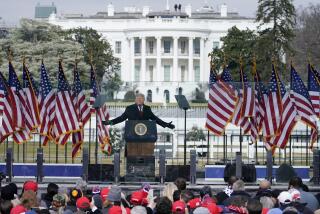Senate, House Delegations Split on Bases : Congress: Californians in lower house are urging Clinton to hold firm on proposed closures while senators call on him to reject the recommendations.
On the Senate side of the Capitol, a group of California members of Congress huddled Wednesday to keep the heat on President Clinton to reject a set of the base closure recommendations that could affect nearly 27,000 military and civilian jobs in the state.
Hours later in the House, San Diego-area Republican Reps. Randy (Duke) Cunningham and Duncan Hunter urged the White House not to succumb to the political pressure and send the commission’s report to Congress intact.
Both groups hope to sway the President as he awaits the official report from the Defense Base Closure and Realignment Commission, to be delivered Friday, that has become political dynamite since the panel finished its deliberations last Friday.
Commission Chairman Alan J. Dixon will hold a news conference at the Capitol to officially release the panel’s findings. Clinton then has until July 15 to accept or reject them. He can also return the findings with his specific objections.
Unlike previous rounds of base closings in 1991 and 1993, the White House has come under intense pressure to throw out the panel’s findings.
On Wednesday, Sen. Dianne Feinstein (D-Calif.) hosted a bipartisan strategy session for a handful of California members whose bases were ordered shut down by the commission.
The group agreed to contact members in other states hit hard by base closing decisions and encourage local officials and business leaders to call the White House expressing their opposition to the proposed cuts, whose major victims include McClellan Air Force Base in Sacramento and the Long Beach Naval Shipyard.
More important, they also signed a letter requesting a meeting--possibly today--with Clinton to make their case that the cuts in California are too harsh.
“There is nothing miraculous or sacrosanct about this process,” Feinstein said. “It functions like a doomsday machine. . . . I feel very strongly that the President should veto this round.”
But on the House side of the Capitol, the other band of outspoken members, joined by House Majority Leader Dick Armey, made just as fervent a plea to Clinton to retain the integrity of the base closing process.
“It would be a huge mistake for the President to make the decision based on [California’s] 54 electoral votes,” Cunningham said. “Tampering with the base closing process would only further draw down our defense budget and put our national security at risk.”
The base closing process is designed to save billions of dollars that the armed services need to spend on personnel, training and weapons systems.
As usual, the commission’s recommendations have produced enduring howls of outrage from members whose bases were ordered closed. Those who have fared well by the process are singing its praises. And those unaffected are holding their tongues.
Sens. Barbara Boxer (D-Calif.) and Feinstein are taking up the cause of Sacramento, Oakland, Long Beach and other cities whose bases were ordered closed.
But San Diego, which the Navy has designated as its major West Cost home port, stands to gain more than 2,500 jobs in the present round.
In previous rounds, the commission’s report has quickly been sent by the White House to Congress, where support for getting rid of unneeded military bases easily outweighed the upset by those states taking the biggest hits.
But this is the final round of closings called for in a 1990 law, and members of Congress are willing to go to unusual lengths to derail the process.
“This isn’t the first round . . . and we don’t have to worry about precedent,” said Feinstein. “We’re talking about fairness.”
The base closing law, authored by Armey, was designed to shield the politically charged process from political influence. This year, members are going out of their way to inject politics into it.
“There is the political reality . . . of hurt to California, of the economic impact to California,” Boxer said after the strategy session. “If we do anything to further the hurt to California, the voters will remember that.”
Unlike previous rounds, the White House is being dared to ignore the warnings.
Asked what she expected from Clinton, Feinstein said: “A willingness to say, ‘Hey, commission, you didn’t do this job right. I’m going to cancel it out.’ That’s what we have presidents for.”
More to Read
Get the L.A. Times Politics newsletter
Deeply reported insights into legislation, politics and policy from Sacramento, Washington and beyond. In your inbox three times per week.
You may occasionally receive promotional content from the Los Angeles Times.






